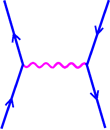John Terning
![]()
John Terning is a Professor of Physics at UC Davis. He received his Ph.D. at the
University of Toronto in 1990 and has done postdoctoral research at Yale, Boston University, the
University of California, Berkeley, and Harvard. He was a staff member at Los Alamos National Lab from 2001 to 2004. He is also the author of a graduate textbook on supersymmetry.
phone:
fax:
e-mail:
(530) 231-2540
(530) 752-4717
terning@physics.ucdavis.edu
Why should a society do theoretical particle physics?
- To answer the ultimate why's
Why do most (but not all) of the known particles have mass? Why do they have the masses they do? Why is the universe composed of matter rather than equal parts matter and anti-matter? Are quarks and leptons the fundamental building blocks of nature? These are some of the questions that particle theorists are trying to answer by coming up with new theories and models. Fortunately they and their flights of fancy are kept in line by experimentalists who check the theorist's predictions.
- Researchers make good teachers
People who are excited about learning and doing research themselves often are the best candiates to transfer their enthusiasm and skills to the next generation. This was discussed in an article by Thomas Devlin in the New York Times.
- Spinoffs
Basic physics research has produced a series of spinoffs for the last hundred years. The transistors in computer chips and the cathode ray tubes in television sets both arose in physics laboratories. The latest technological spinoff from physics is the World Wide Web itself, developed by Tim Berners-Lee at CERN.
[Loading articles...]

